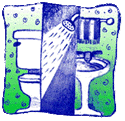Sewage-liquid waste planning
 Introduction
Introduction
The Regional District of Nanaimo provides those services that are best delivered on a cooperative, region-wide basis. Long term planning and management of the Region's sewage treatment, utilization and disposal needs is a prime example of such a service.
Recognizing the critical importance of clean water to its citizen's health and quality of life, the RDN initiated its first liquid waste, (or sewage treatment and disposal) study in 1970. The Regional District has prepared a Liquid Waste Management Plan to develop programs and infrastructure that will provide a comprehensive and long-term approach to managing the Region's liquid waste treatment, utilization and disposal needs over the next 20 years. The District acknowledges that Island Trust has jurisdiction/responsibility over all aspects of planning for the Gulf Islands including Gabriola and that First Nations have jurisdiction/responsibility over all aspects of planning for Indian Reserves. Even though the Plan does not apply to their areas, as members of the community, these two jurisdictions were invited and participated in the development of this Plan. Guiding principles used to develop the Plan include the following:
- the goals of the District environmental policies are to not exceed the capacity of the environment to assimilate waste, and to ensure protection of human health, with the strategies for achieving these goals being in accordance with the precautionary principle.
- The regional liquid waste stream is reduced to the greatest extent possible, in accordance with the hierarchy of reduce, reuse, and recycle, while considering local resources and the nature of the Region liquid waste stream.
- The LWMP for the District is developed in concert with the Regional Growth Management Plan (RGMP), adopted by the District and its member municipalities in January 1997. The LWMP is consistent with goals, policies and guidelines of the RGMP and its Vision Statement. The LWMP specifically recognizes and supports the RGMP goals of urban containment, protecting rural integrity, protecting the Agricultural and Forest Land Reserves (by not allowing the provision of a sewer system to facilitate development), efficient use and management of services and resources, and cooperation amongst jurisdictions.
- Individual, institutions and companies are enabled to make environmentally sound choices about consumption of resources and generation of liquid waste through provision of appropriate information and assistance with the development of appropriate codes of practices, policies and procedures. User-pay principles and market-based incentives will be used wherever possible to encourage participation.
- Liquid waste policies and strategies are developed through an open and effective public consultation process in a cooperative manner between government, private enterprise and community stakeholders.
- Sewage treatment facilities are located, designed and operated to minimize adverse impact on neighbouring development through provision of aesthetic and odour mitigation measures.
- The evaluation of liquid waste management alternatives takes into account technical, life cycle cost, environmental and social factors in order to provide decision makers with a balanced perspective on the alternatives for consideration.
- The overall program is flexible and can be modified to meet changing conditions such as future demands, new environmental criteria and evolving technologies.
Liquid Waste Management Planning is one important link that will contribute to the sustainability and liveability of the region.
Liquid Waste Management Plan
Liquid waste is the technical term for what's flushed down the toilet or washed down the drain. And in its various forms - from sewage to stormwater - liquid waste is a major environmental responsibility.
That's why the Regional District's Liquid Waste Management Plan is an important tool for protecting quality of life in the region. It sets out the Region's commitment to safeguarding its water quality and related natural resources. The Plan provides a comprehensive, long-range, region-wide approach to managing liquid waste, including reduction, reuse, and safe disposal of treated effluent.
The Liquid Waste Management Plan has been guided by the Growth Management Plan and supports its goals of environmental protection, improving efficiency of services, and containing urban sprawl. The Liquid Waste Management Plan identifies several major infrastructure projects that will be undertaken over the next 20 years. Residents in the benefiting areas will pay for these projects. Expansion and upgrading of the Greater Nanaimo and Nanoose Bay sewage treatment plants are two such future projects.
Liquid Waste Management Plan Policies and Programs
Everyone in the RDN benefits from the Regional District's Liquid Waste Management Plan. By establishing long range planning objectives and designing specific liquid waste management programs, the Plan will ensure that our region's high quality of life is maintained. Specific initiatives include:
- Rural Areas - The Liquid Waste Management Plan anticipates the sewer servicing needs of future Village Centres, identifies areas with potential problems due to failing septic systems, and provides approaches to solving these problems.
- Source Controls - The Plan also proposes measures and regulations to prevent toxic materials from entering septic systems, sewers and storm drains. A public education program is included in the Plan's source control measures.
- Volume Reduction - Water conservation programs are ongoing to reduce the amount of water we use, thereby reducing our requirements for future treatment and ensuring a sustainable water supply for our future.
- Stormwater Management - Regional stormwater run-off management programs will be coordinated in coming years to address specific stormwater concerns.
- Odour Control - Objectionable odour around regional sewage treatment plants are a significant concern. Odour control is a formal program within the Liquid Waste Management Plan.
A copy of the Liquid Waste Management Plan is available by contacting RDN Environmental Services.
